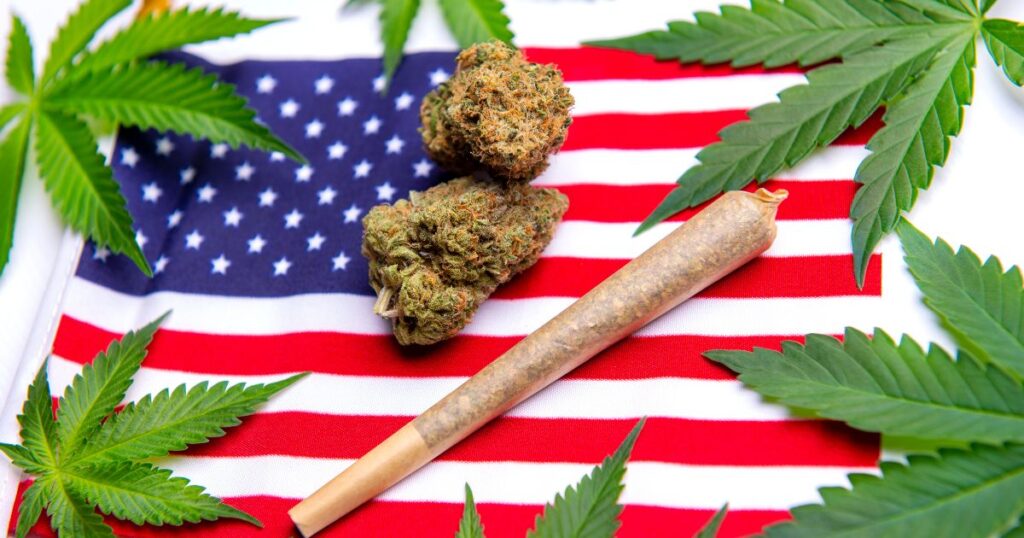A noticable shift in American attitudes toward cannabis has reached a historic milestone. Recent research from the Pew Research Center reveals that an overwhelming 87% of Americans now support legalizing marijuana in some form—marking one of the most dramatic policy reversals in modern American history.
The findings paint a picture of a nation ready to move beyond decades of prohibition. This isn’t just about changing laws anymore. It’s about reflecting the will of the American people, who have fundamentally reconsidered their relationship with cannabis after witnessing its medical benefits, economic potential, and the social costs of criminalization.
A Clear Mandate for Change
The Pew Research Center’s January-February 2025 survey of 5,086 American adults delivers compelling evidence that prohibition no longer reflects public sentiment.
More than half of respondents (54%) believe cannabis should be legal for both medical and recreational use, while an additional 33% support medical-only legalization. Only 12% of Americans still believe cannabis should remain completely illegal.
These numbers represent more than statistical data—they reflect millions of Americans who have personally witnessed cannabis helping family members with chronic pain, veterans with PTSD, children with epilepsy, and cancer patients undergoing chemotherapy.
Legal states haved generated billions in tax revenue while reducing incarceration rates. They’ve watched as fear-based predictions about legalization failed to materialize in the 24 states that now allow recreational use.
Beyond Political Divides
Perhaps most striking is how cannabis legalization has transcended traditional political boundaries. While Democrats show stronger support for full legalization (66% compared to 43% of Republicans), a remarkable 81% of Republicans still support legalization in some form. This bipartisan consensus suggests that cannabis reform isn’t just a liberal cause—it’s an American cause.
The data reveals that moderate and liberal Republicans (56%) express nearly identical levels of support for full legalization as conservative and moderate Democrats (57%).
This suggests that direct experience with cannabis legalization in various states has helped bridge ideological gaps. When people see their communities functioning normally—or even thriving—after legalization, abstract political positions give way to practical reality.
The Economic Reality
States with legal cannabis markets provide compelling evidence for the economic benefits of legalization. Colorado, one of the first states to legalize recreational use, has generated over $2 billion in tax revenue since 2014.
California’s legal cannabis market contributes over $1 billion in tax revenue in yearly alone. These aren’t just numbers in government budgets—they represent funding for schools, infrastructure, mental health programs, and substance abuse treatment.
The Pew research found that 52% of Americans believe legalizing recreational marijuana is good for local economies, with only 17% viewing it as harmful. The understanding of cannabis as an economic driver has helped shift public opinion from moral objections to pragmatic support.
Criminal Justice Reform
The human cost of cannabis prohibition has also influenced public attitudes. The research shows that 42% of Americans believe legalization makes the criminal justice system more fair, compared to just 18% who see it as less fair.
This reflects growing awareness that cannabis arrests have disproportionately affected communities of color and consumed enormous law enforcement resources.
Two-thirds of Americans support releasing people imprisoned solely for marijuana-related offenses, while 61% favor expunging cannabis convictions from criminal records.
These numbers show a fundamental shift in how Americans view justice and redemption. They recognize that people shouldn’t have their lives derailed by activities that are now legal in most states.
Geographic Momentum
The expansion of legal cannabis continues across America. Twenty-four states and the District of Columbia now allow recreational use, while another 24 states have medical programs.
This means 54% of Americans live in a state where recreational cannabis is legal, and 79% live in a county with at least one licensed dispensary.
The proliferation of dispensaries—nearly 15,000 nationwide—has normalized cannabis access for millions of Americans. These businesses operate like any other retail establishment, with professional staff, regulated products, and tax-paying operations.
This normalization has helped reduce stigma and demonstrate that legal cannabis markets can function safely and responsibly.
Medical Benefits Drive Support
The medical cannabis movement has been instrumental in changing public opinion. States began legalizing medical marijuana in the 1990s, allowing Americans to see firsthand how cannabis could help treat serious medical conditions.
Today, medical marijuana programs exist in 48 states, giving millions of patients legal access to cannabis treatments.
The therapeutic benefits of cannabis for conditions like chronic pain, epilepsy, PTSD, and cancer symptoms have been crucial in shifting public perception.
When people see their loved ones finding relief through cannabis—often after traditional medications have failed—abstract policy debates become personal experiences.
Looking Forward
The overwhelming support for cannabis legalization represents more than changing attitudes about one plant. It reflects a larger shift toward evidence-based drug policy, criminal justice reform, and individual freedom.
Americans have witnessed decades of prohibition fail to reduce cannabis use while creating enormous social and economic costs.
Pews research shows that support for legalization has more than doubled since 2000, rising from 31% to 70% in general polling. This isn’t a temporary trend—it’s a fundamental transformation in how Americans think about cannabis, justice, and government policy.
As more states consider legalization and federal reform remains stalled, the Pew findings provide clear evidence that the American people are ready for change. The question isn’t whether cannabis will be legal nationwide—it’s when lawmakers will catch up to their constituents.
New Chapter Needed for Cannabis in America
The path forward seems clear. With 87% of Americans supporting some form of legalization, continued prohibition increasingly appears out of step with public sentiment.
The states that have embraced legal cannabis markets have demonstrated that regulation works better than prohibition. They’ve shown that adults can use cannabis responsibly, that legal markets can operate safely, and that tax revenue can fund important public programs.
The American people have spoken through polls, ballot initiatives, and their acceptance of legal cannabis in their communities. They’ve moved beyond the fear-based rhetoric of prohibition to embrace a more rational, compassionate approach to cannabis policy. The time has come for federal law to reflect this new reality.
As we move forward, the focus should shift from whether to legalize cannabis to how to do it in a way that promotes public health, social justice, and economic opportunity. The American people are ready for this conversation. The only question is whether their elected representatives will listen.





















